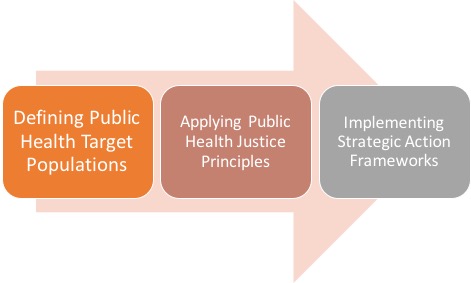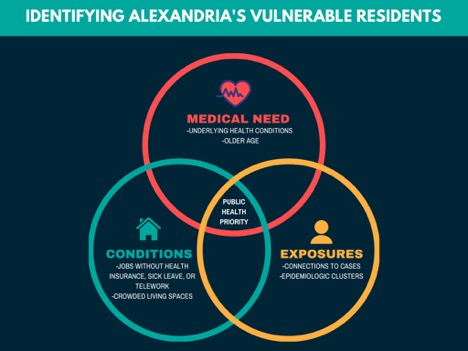
COVID-19 Strategic Action Frameworks
Overview
Since early January 2020, Alexandria Health Department’s (AHD’s) pandemic response has evolved as public health learns more about CoV-SARS-2, the novel virus that causes COVID-19. Pandemic response is heavily informed by constantly updated guidance from the U.S. Centers for Disease Control and Prevention and the Virginia Department of Health. To build an Alexandria-specific approach, AHD has combined local data analysis with Public Health Justice Principles for a series of Strategic Action Frameworks.

AHD has developed and begun implementation of the following Strategic Action Frameworks to stop the spread of COVID-19. Each Framework is a living document that is adapted or modified based on evolving understanding of COVID-19 or shifting resources.
Defining Alexandria’s Vulnerable Populations
AHD uses multiple data sources and methods to identify Alexandria’s most vulnerable populations.
The 2019 Community Health Assessment (CHA) uncovered significant disparities in Alexandria based on race, ethnicity, ZIP code, education level, age, and gender identity because of historic and current discriminatory policies that create inequitable conditions.
The CHA highlighted the prevalence of chronic illnesses in our community, many of which exacerbate the severity of a COVID-19 infection. The CHA also described Alexandria’s living and working conditions such as the lack of affordable housing and number of residents living in poverty, or near-poverty, despite a high area median income.

AHD greatly values the qualitative data gathered from relationships with trusted community partners. This real-time information about community needs and gaps in information influence AHD’s actions and priorities. Community members—particularly those from marginalized populations—may not trust local government enough to provide feedback directly so guidance from community leaders is crucial.
AHD also utilizes critical epidemiologic data to identify COVID-19 outbreaks and clusters of infection. This analysis allows AHD to deploy and refocus resources into case investigations in attempts to contain the spread of COVID-19.
Using these data sources and methods, AHD defines the most vulnerable residents related to COVID-19 as older adults, those with underlying health conditions, those who live in crowded conditions, and people without sick leave or health insurance. In Alexandria, this burden predominantly falls on those in long-term care facilities, congregate living facilities, and our communities of color.
Public Health Justice Principles Overview
AHD has concentrated and fortified its decision-making processes into what AHD has expressed as Public Health Justice Principles, comprised of the following:
- Prioritize science-based recommendations
- Focus resources on saving lives
- Engage and empower Alexandrians most in need
PRIORITIZE SCIENCE-BASED RECOMMENDATIONS
In the evolution of novel diseases, uncertainty, rumors, rapidly changing information, and the desire for answers and solutions can compel actions that are ineffective and/or harmful. AHD is committed to prioritizing science-based recommendations—recognizing that such recommendations will change with science’s understanding of a novel disease—to reduce the risk of harm to individuals or populations and to maximize effectiveness of limited resources.
FOCUS RESOURCES ON SAVING LIVES
From the earliest reports from China and the World Health Organization, and from both early and recent data from the CDC and VDH, there is a higher risk for severe disease from COVID-19 for persons age 65 and older, persons who live in a long-term care facility (LTCF), and persons with serious underlying medical conditions (e.g. chronic lung disease, serious heart conditions, immunocompromised, severe obesity, diabetes, liver disease, and kidney disease requiring dialysis). The most profound result of severe disease is death. From the beginning of the pandemic response, AHD has focused its resources into efforts with these target populations to reduce COVID-19 related fatalities.
ENGAGE AND EMPOWER ALEXANDRIANS MOST IN NEED
Public health research demonstrates that certain members of our community are most susceptible to the adverse effects of both chronic and infectious diseases (cancer, heart disease, lung disease, diabetes, tuberculosis, influenza and other vaccine-preventable illnesses) as well as public health emergencies. These same populations, usually communities of color, the elderly and low-income residents, are often subject to an additional injustice of being marginalized in civic conversations and decision-making. AHD will continue to engage community leaders and residents to inform communications strategies that empower individuals, families and groups to take appropriate COVID-19 mitigation actions. AHD also utilizes meaningful community engagement to develop strategies for access to care and other resources.
AHD is committed to following our Public Health Justice Principles even when they are not convenient or popular.
Building Strategic Actions from Principles
AHD conducts the following actions on a continuous basis in accordance with Public Health Justice Principles. Each action has been folded into one of AHD’s Strategic Action Frameworks.
PRIORITIZE SCIENCE-BASED RECOMMENDATIONS
- Synthesize evolving CDC and VDH recommendations including guidance on testing and treatment of COVID-19, and disseminate to Alexandria healthcare providers
- Advise City agencies, nonprofits, businesses, schools, and community and faith based organizations
- Monitor global, national, state and local surveillance data and direct resources accordingly
- Develop and distribute educational health materials for the public that exceed state requirements and are targeted for Alexandria populations
- Conduct case investigation and contact tracing; link persons in need to appropriate resources to enable adherence to isolation and quarantine recommendations
FOCUS RESOURCES ON SAVING LIVES
- Concentrate intensive work with LTCFs and congregate living settings
- Provide information and guidance via group conference calls, individual facility phone calls, blast-faxes and emails
- Train long-term care staff on COVID-19 recognition, prevention, control and mitigation
- Provide personal protective equipment (respirators, face masks, face shields/ goggles, isolation gowns, gloves) to protect staff and residents
- Assess and support infection control measures
- Coordinate, facilitate and conduct point prevalence surveys to ascertain level of infection and direct prevention strategies
- Conduct data monitoring and analysis to determine those most at-risk of hospitalization and death from COVID-19 infection
ENGAGE AND EMPOWER ALEXANDRIANS MOST IN NEED
- Inform and educate residents, through robust and varied communications tactics, how to protect themselves, their families, their businesses and others
- Identify needs and coordinate provision of basic needs supplies (food, cleaning items, diapers, rental support, housing, etc.) to enable persons to successfully isolate (positive cases) and quarantine (contacts to cases)
- Provide PPE, fit-testing, training and technical assistance so Alexandria healthcare providers can initiate, maintain and expand testing capacity, including federal reimbursements for testing individuals without insurance
- Support targeted community testing efforts to reach those at greatest risk of severe disease and with historic barriers to accessible healthcare
- Provide, through community organizations and leaders, information on testing availability – both single events and ongoing in medical practices
- Partner with local providers to facilitate enrollment in a medical home for ongoing care access (i.e. care should be convenient for the patient, not just the provider)